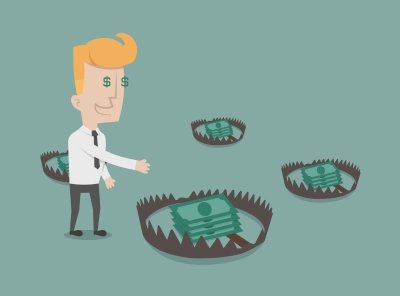We just had this same dilemma in my own household. After having tapped our emergency fund for immediate cash to use a down payment on our new house, we’ve now got a big hole to fill.
But that poses a financial problem. Every penny we earn that exceeds our budget is supposed to go towards our early retirement by age 45 plan.
Plus, as we’ve demonstrated before here, saving your money in tax-sheltered accounts can compound into huge financial benefits later on.
So then, why am I choosing to build back up my rainy day fund and put my extra retirement savings efforts on pause for a moment?
For a very good reason! But first, let’s weigh out the two choices to better understand how one may be more advantageous than the other.
Saving More for Retirement
Just to be clear, it’s not like I’m not saving “nothing” for retirement anymore. We’re still saving a boat-load of money in our Roth IRA’s and 403(b). I’m also saving way more than I need to in my new 401(k) in order to meet the full employer match at my new job.
My attitude towards trying to achieve financial freedom has always been to save all the way up to the IRS limit for each our tax-sheltered retirement accounts. That’s exactly how Robert and Robin Charlton from the book How to Retire Early were able to pull off retirement by their early 40’s.
Also by maxing out the IRS limits, you not only build up a tremendous amount of capital very quickly, you also save yourself thousands of dollars in tax payments every year.
Think about it: Who would you rather pay – yourself or the tax man?
That’s what I thought!
Rainy Day Savings Don’t Really Generate Money
One of the biggest criticisms I’ve always heard from people AGAINST having too much in rainy day savings account is that they don’t make you any money.
Why in the word would I want to park +$10,000 in a savings account that earns less than 1% interest?
What does that work out to in earnings? … $100 in interest for the year? (Sarcastic) Oh, Boy!
Invest that money into a stock market index fund and you could be potentially earning an average of 8 to 10% interest annually.
While one year might not be a big deal, what about 3 to 10 years? You could be missing out on a lot of potential earnings!
Even on this site here I posed the same sort of question when I was trying to decide if I should invest a portion of my emergency savings in a semi-stable mutual fund. My logic – why not invest a small portion in a fund that is made of semi-stable assets like bonds and money market funds. (By the way – I lost about $100 on that decision when I finally cashed it out. I guess that wimpy 1% savings account was the better choice after all!)
So while you may not be exactly killing it in earnings by keeping a sizeable rainy day savings fund, does that really make it the better decision … financially?
How about we look at the bigger picture and look at things from a different angle.
Avoiding Credit Card Debt
What happens when trouble arrives?
Unfortunately for a lot of people, the first place they look to for relief is a credit card. Why? Because it’s a very quick and easy solution to get cash in a flash.
Oh, no! Your car broke down? You’re not going to have time to go get a few extra thousand dollars to get it fixed. You’re going to NEED a solution fast! That’s where you get into the credit card trap. You just swipe that card and the car shop goes to work making everything better.
But then after a month, the trouble begins. You’re stuck trying to figure out how you’re going to come up with enough money to cover this mess. And unfortunately if you don’t have enough to pay for it all at once, then you’ll be looking at being charged anywhere from 15 to 30% interest ON TOP of the balance you weren’t able to afford.
Hello and welcome to DEBT city!
So, if we think about it in that way, there is an opportunity cost involved by not having a rainy day fund ready to go. Your emergency fund is potentially saving you 15 to 30% in future interest penalties; interest you would have to otherwise pay off if you weren’t ready for it.
So in a sense, 15 to 30% is actually what your emergency cash is really worth to you!
Conclusions
While there may not be direct earnings to be made on a rainy day savings account, there is certainly an opportunity cost … and it can cost you BIG if you’re not prepared. That’s why I’m going to focus to building back up our emergency fund before I worry about trying to save above and beyond for retirement. Once things get back up to a sustainable level, then we can start applying the extra earnings towards my extreme saving goal. But until then, building up those emergency savings for anything that might or might not happen will be what we focus on. Even though the savings may not be earning me 10%, stock-market-style returns, the fact that it could potentially rescue me from 15 to 30% credit card debt is enough to capture my vote.
Readers – What motivates you to build up your emergency fund; despite knowing that you won’t be making millions of dollars in earnings from it?
Images courtesy of Chris Goldberg | Flickr and FreeDigitalPhotos.net




I have my emergency fund because I expect the unexpected. I think MMD your decision is the ideal and I agree with you. And, we don’t want to be forced to rely on credit cards or a loan, which could simply compound some problems.
Exactly. It’s bad enough to deal with the problem at hand. But then financially it could snow ball into something a lot worse.
We tend to take the same approach when in this situation. There’s a certain level I like to be at with our main EF and a couple of our smaller, yet still emergency related funds. If we have to tap one of those significantly we’ll pull back some on our retirement funds to get the EF back to that minimum level. Thankfully, at least in recent memory, that doesn’t mean we’re unable to get to where we want in the year retirement savings wise. Like you said, the EF does little for the long-term earnings, but having that ability to be prepared for more short term or medium term goals are important.
Precisely. Even though there’s not much to gain in earnings from having an emergency fund, there is certainly a lot to be lost.
That is the main point of having an EF fund, to avoid adding new debt and to live at peace. Granted we might not know the amount needed in an emergency, but just having 3-6 months of expenses is good enough for most situations. I also like to consider a portion of my Roth IRA as part of my overall emergency funds, because contributions can be taken out penalty free after some years. That’s why I have both the ROTH and the EF fund.
I’ve given the Roth concept a lot of thought over the years. As long as you’re past the five year mark, then you should be good. The thing people have to remember, though, if they do use their Roth as an emergency fund is that the situation then truly has to be “an emergency”. It would be a shame to sabotage your retirement account because you forgot to pay a bill or weren’t prepared to handle a random car repair.
MMD, it’s like we had the same thought at once from two different angles.
I just wrote a whole article on no credit check loans. Both the good and the bad. One reason to live below your means and have an emergency fund is to avoid these types of loans. The APR can go above 700%!
If THAT doesn’t motivate someone to have an emergency fund, then I don’t know what will. These loans were built with emergencies in mind. I’d rather have an emergency fund than get an emergency loan. One pays me a small APY. The other charges me a huge APR.
Sincerely,
ARB–Angry Retail Banker
Wow! It’s insane that products like that can exist in our market. Its like legal extortion. When you don’t have enough money to bail yourself out, the sharks really do smell blood and come looking for you.
Having been well and thoroughly burnt by failing to have an emergency fund in my 20s, I have no problems keeping a significant amount of money in cash. Since I remember what a real economy looks like which doesn’t punish savers like today’s ZIRP world, it annoys me to no end to have so little income from that cash.
But I’d rather have the cash than the pain that comes when you don’t and the unexpected strikes.
I hear you on being punished for saving. I can’t wait until interest rates go back up again and we can park our money safely in a place that at least keeps up with the rate of inflation.
It’s really good to at least keep some of your savings in a bank account for quick access. I liked having some of my money in stocks, but cashing out takes a few days to get that money back. We had to bail my brother-in-law out of jail and it would have taken 5 days for that money to be deposited in my bank account.
Emergency funds are there to protect you, I personally think that it is a smart decision to build it back up.